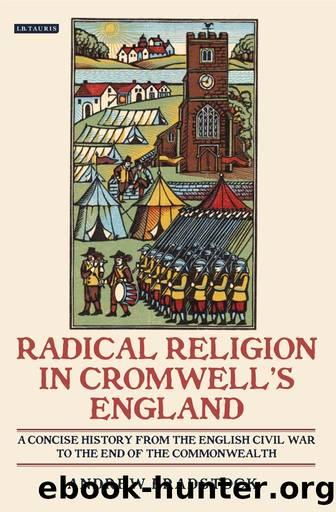Radical Religion in Cromwell's England by Andrew Bradstock

Author:Andrew Bradstock [Bradstock, Andrew]
Language: eng
Format: epub
Tags: History, Europe, Great Britain, General, Modern, 16th Century, Ireland, Religion, Renaissance
ISBN: 9780857732033
Google: JJ-LDwAAQBAJ
Publisher: Bloomsbury Publishing
Published: 2010-12-07T22:28:33+00:00
âThere is no sinâ: this was an article of faith for Ranters, who held that the Mosaic law was no longer binding upon true believers such as themselves. While many of their contemporaries, including Baptists, were âantinomianâ in the sense that they saw the gospel in terms of an unconditional gift from God rather than a law that carried obligations and required obedience on the part of the believer, they nevertheless believed that they should continue to obey the law as evidence of their faith. Ranters, however, took the extreme line that, if God indwelt a person, it was impossible for that person to commit sin and the law was therefore irrelevant.
The roots of their extreme antinomianism lay in their strong mystical and pantheist convictions: for Ranters, God had not only created all things but was present in everyone and every living thing; there was no God other than the one who indwelt the creation, âman and beast, fish and fowl, and every green thing, from the highest cedar to the ivy on the wallâ, as Jacob Bauthumley put it. God does not exist outside the creatures: God is in âthis dog, this tobacco pipe, he is me and I am himâ. The only difference in status between humankind and other objects of creation was the extent to which God was manifest in each. Only a few Ranters took this to the extreme of claiming actually to be God, but many did reach the conclusion that, since all their acts were prompted by God within, it was impossible for them to sin. Sin, if it existed, must be part of Godâs plan. âA man as man hath no more power or freedom of will to do evil than he hath to do goodâ, said Bauthumley; or as Richard Coppin (who denied being a Ranter but whose Divine Teachings was read by them) argued, the âspiritual man can be no less than God, who is in all thingsâ, and therefore, like God, perfect, for âwhere he is he is perfect; and in whom he is, he is perfect ...â. Seeing men and women as identical with the beasts, which is what Clarkson thought the writer of Ecclesiastes meant when saying that the fate of humans and animals was the same in that both returned to dust (3.19â20), gave some Ranters a perfect licence for unrestricted behaviour.
Sin, then, was entirely imaginary, a human creation, for, as Lawrence Clarkson argued, âGod made all things good ... [and] ... there was no such thing as theft, cheat or a lie, but as man made it so.â âWhat act soever is done by thee in light and love, is light and lovely, though it be that act called adultery ... No matter what Scripture, saints or churches say, if that within thee do not condemn thee, thou shalt not be condemned.â âFor sinâ, wrote Bauthumley, âI cannot tell how to call it any thing, because it is nothing: I cannot give it a name, because it has no substance or creature.
Download
This site does not store any files on its server. We only index and link to content provided by other sites. Please contact the content providers to delete copyright contents if any and email us, we'll remove relevant links or contents immediately.
| General | Channel Islands |
| England | Northern Ireland |
| Scotland | Wales |
Room 212 by Kate Stewart(5091)
The Crown by Robert Lacey(4791)
Endurance: Shackleton's Incredible Voyage by Alfred Lansing(4743)
The Iron Duke by The Iron Duke(4336)
The Rape of Nanking by Iris Chang(4189)
Joan of Arc by Mary Gordon(4080)
Killing England by Bill O'Reilly(3987)
Say Nothing by Patrick Radden Keefe(3964)
I'll Give You the Sun by Jandy Nelson(3415)
Shadow of Night by Deborah Harkness(3341)
Hitler's Monsters by Eric Kurlander(3320)
Mary, Queen of Scots, and the Murder of Lord Darnley by Alison Weir(3189)
Blood and Sand by Alex Von Tunzelmann(3181)
Eleanor & Park by Rainbow Rowell(3139)
Darkest Hour by Anthony McCarten(3112)
Margaret Thatcher: The Autobiography by Thatcher Margaret(3065)
Book of Life by Deborah Harkness(2913)
Red Famine: Stalin's War on Ukraine by Anne Applebaum(2909)
The One Memory of Flora Banks by Emily Barr(2847)
